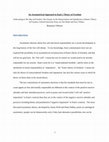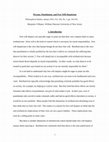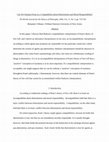Papers by Benjamin Vilhauer
European Journal of Philosophy, 2021
Kant's notion of (what I will call) rational sympathy solves a problem about how we can voluntari... more Kant's notion of (what I will call) rational sympathy solves a problem about how we can voluntarily fulfill our imperfect duty to adopt those ends of others which have value only because they have been set by rational agents, ends which I will refer to as merely permissible ends (MPEs). Others' MPEs are individuated in terms of their own concepts of their MPEs, and
Kantian Review, 2021
This paper argues that Kant endorses a distinction between rational and natural sympathy, and it ... more This paper argues that Kant endorses a distinction between rational and natural sympathy, and it presents an interpretation of rational sympathy as a power of voluntary a posteriori productive imagination. In rational sympathy we draw on the imagination's voluntary powers (a) to subjectively unify the contents of intuition, in order to imaginatively put ourselves in others' places, and (b) to associate imagined intuitional contents with the concepts others use to convey their feelings, in such a way that those contents prompt feelings in us that are like their feelings.

Asymmetry theories about free will and moral responsibility are a recent development in the long ... more Asymmetry theories about free will and moral responsibility are a recent development in the long history of the free will debate. Kant commentators have not yet explored the possibility of an asymmetrical reconstruction of Kant's theory of freedom, and that is my goal in this paper. Asymmetry theorists hold that the standards that must be met to count agents as free and morally responsible are different in the context of the positive reactive attitudes and their attendant practices, such as praise and reward, than they are in the context of the negative reactive attitudes and practices including blame and punishment. The most-discussed asymmetry theory, developed by Susan Wolf and Dana Nelkin, posits an ontological asymmetry: people can be blameworthy only if they had alternative possibilities, but can be praiseworthy even if they did not have alternative possibilities. I have argued that even if we do not posit such an ontological asymmetry, we should acknowledge an epistemic and justificatory asymmetry—even if the ontological requirement agents must satisfy to be blameworthy is the same as the one they must satisfy to be praiseworthy, we must have better reasons for believing that the ontological requirement is satisfied to legitimately treat agents as morally responsible in the context of the negative reactive attitudes than we must have in the context of the positive reactive attitudes. This is because it is intuitive to think that people deserve the benefit of the doubt, and that there is a hazard of injustice in getting things wrong in connection with blame which does not exist in connection with praise, or at least does not exist in the same way or to the same degree. I will not propose a reconstruction of Kant's theory of freedom that posits an ontological asymmetry, since Kant is consistent about the ontology of transcendental freedom throughout his texts. But given the dramatic shifts in Kant's epistemology of transcendental freedom and the inconsistencies they inflict upon commentators, I think a reconstruction which posits a justificatory asymmetry should be of interest. The reconstruction I want to propose is meant to be revisionary: I think that while Kant got a great deal right about the building blocks of his theory of freedom, he never fits them together in a stable way in his own texts. So this reconstruction does not describe the theory of freedom I think he actually held himself, but rather the one I think he ought to have held, and one which can be defended in contemporary discussions about free will.
This paper is about an asymmetry in the justification of praising and blaming behavior which free... more This paper is about an asymmetry in the justification of praising and blaming behavior which free will theorists should acknowledge even if they do not follow Wolf and Nelkin in holding that praise and blame have different control conditions. That is, even if praise and blame have the same control condition, we must have stronger reasons for believing that it is satisfied to treat someone as blameworthy than we require to treat someone as praiseworthy. Blaming behavior which involves serious harm can only be justified if the claim that the target of blame acted freely cannot be reasonably doubted. But harmless praise can be justified so long as the claim that the candidate for praise did not act freely can be reasonably doubted. Anyone who thinks a debate about whether someone acted freely is truth-conducive has to acknowledge that reasonable doubt is possible in both these cases.

The Philosophical Quarterly
An apparently increasing number of philosophers take free will skepticism to pose a serious chall... more An apparently increasing number of philosophers take free will skepticism to pose a serious challenge to some of our practices. This must seem odd to many—why should anyone think that free will skepticism is relevant for our practices, when nobody seems to think that other canonical forms of philosophical skepticism (for example, skepticism about induction or other minds) are relevant for our practices? Part of the explanation may be epistemic, but here I focus on a metaethical explanation. Free will skepticism is special because it is compatible with ‘basic moral reasons’—moral reasons acknowledged by all mainstream ethicists—and other minds and induction skepticism are not. One example is our reason not to intentionally harm others. Practical seriousness about other minds and induction skepticism undermines this reason, but practical seriousness about free will skepticism only undermines a potential overrider of this reason, that is, the reason of retribution.
This chapter has two goals. First, I will present an interpretation of Kant’s mature account of p... more This chapter has two goals. First, I will present an interpretation of Kant’s mature account of punishment, which includes a strong commitment to retributivism. Second, I will sketch a non-retributive, “ideal abolitionist” alternative, which appeals to a version of original position deliberation in which we choose the principles of punishment on the assumption that we are as likely to end up among the punished as we are to end up among those protected by the institution of punishment. This is radical relative to Kant’s mature theory of punishment, but arguably it conforms better to the spirit of Kant’s first Critique remarks on imputation and punishment than his mature theory does.
British Journal for the History of Philosophy
Southern Journal of Philosophy
Canadian Journal of Philosophy

Phiilosophical Studies
The purpose of this paper is to provide a justification of punishment which can be endorsed by fr... more The purpose of this paper is to provide a justification of punishment which can be endorsed by free will skeptics, and which can also be defended against the “using persons as mere means” objection. Free will skeptics must reject retributivism, that is, the view that punishment is just because criminals deserve to suffer based on their actions. Retributivists often claim that theirs is the only justification on which punishment is constrained by desert, and suppose that non-retributive justifications must therefore endorse treating the people punished as mere means to social ends. Retributivists typically presuppose a monolithic conception of desert: they assume that action-based desert is the only kind of desert. But there are also personhood-based desert claims, that is, desert claims which depend not on facts about our actions, but instead on the more abstract fact that we are persons. Since personhood-based desert claims do not depend on facts about our actions, they do not depend on moral responsibility, so free will skeptics can appeal to them just as well as retributivists. What people deserve based on the mere fact of their personhood is to be treated as they would rationally consent to be treated if all they had in view was the mere fact of their personhood. We can work out the implications of this view for punishment by developing a “hypothetical consent” justification in which we select principles of punishment in the Rawlsian original position, so long as we are careful not to smuggle in the retributivist assumption that it is under our control whether we end up as criminals or as law-abiding citizens once we raise the veil of ignorance.
The Southern Journal of Philosophy, 2008
Hard determinists hold that we never have alternative possibilities of action-that we only can do... more Hard determinists hold that we never have alternative possibilities of action-that we only can do what we actually do. This means that if hard determinists accept the "ought implies can" principle, they must accept that it is never the case that we ought to do anything we do not do. In other words, they must reject the view that there can be "ought"based moral reasons to do things we do not do. Hard determinists who wish to accommodate moral reasons to do things we do not do can instead appeal to Humean moral reasons that are based on desires to be virtuous. Moral reasons grounded on desires to be virtuous do not depend on our being able to act on those reasons in the way that "ought"-based moral reasons do.

British Journal for the History of Philosophy
In this paper, I discuss Hud Hudson's compatibilistic interpretation of Kant's theory of free wil... more In this paper, I discuss Hud Hudson's compatibilistic interpretation of Kant's theory of free will, and I sketch an alternative interpretation of my own, an incompatibilistic interpretation according to which agents qua noumena are responsible for the particular causal laws which determine the actions of agents qua phenomena. Hudson's interpretation should be attractive to philosophers who value Kant's epistemology and ethics, but insist on a deflationary reading of things in themselves. It is in an incompatibilist interpretation of Kant's theory of free will that a "positive" conception of noumena is at its most important. If a compatibilistic interpretation is acceptable, one might suppose that we can do without a "positive" conception of noumena throughout Kant's philosophy. I demonstrate, however, that there are central elements of Kant's theory of free will that cannot be accommodated within Hudson's interpretation.
American Philosophical Quarterly
Philosophical Investigations, 2003
Cora Diamond is among the most influential Wittgenstein com-mentators of recent years. One of her... more Cora Diamond is among the most influential Wittgenstein com-mentators of recent years. One of her memorable contributions to the literature is her colorful characterization of some of the Tractatus interpretations she disagrees with she calls them chickening out ...
Southern Journal of Philosophy
Hard determinists hold that we never have alternative possibilities of action—that we only can do... more Hard determinists hold that we never have alternative possibilities of action—that we only can do what we actually do. This means that if hard determinists accept the “ought implies can” principle, they must accept that it is never the case that we ought to do anything we do not do. In other words, they must reject the view that there can be “ought”-based moral reasons to do things we do not do. Hard determinists who wish to accommodate moral reasons to do things we do not do can instead appeal to Humean moral reasons that are based on desires to be virtuous. Moral reasons grounded on desires to be virtuous do not depend on our being able to act on those reasons in the way that “ought”-based moral reasons do.
Drafts by Benjamin Vilhauer
Kant's conception of remorse has not received focused discussion in the literature. I argue that ... more Kant's conception of remorse has not received focused discussion in the literature. I argue that he thinks we ought to experience remorse for both retributivist and consequentialist reasons. This account casts helpful light on his ideas of conversion and the descent into the hell of self-cognition. But while he prescribes a heartbreakingly painful experience of remorse, he acknowledges that excess remorse can threaten rational agency through distraction and suicide, and this raises questions about whether actual human beings ought to cultivate their consciences in such a way as to experience remorse on his model.











Uploads
Papers by Benjamin Vilhauer
Drafts by Benjamin Vilhauer